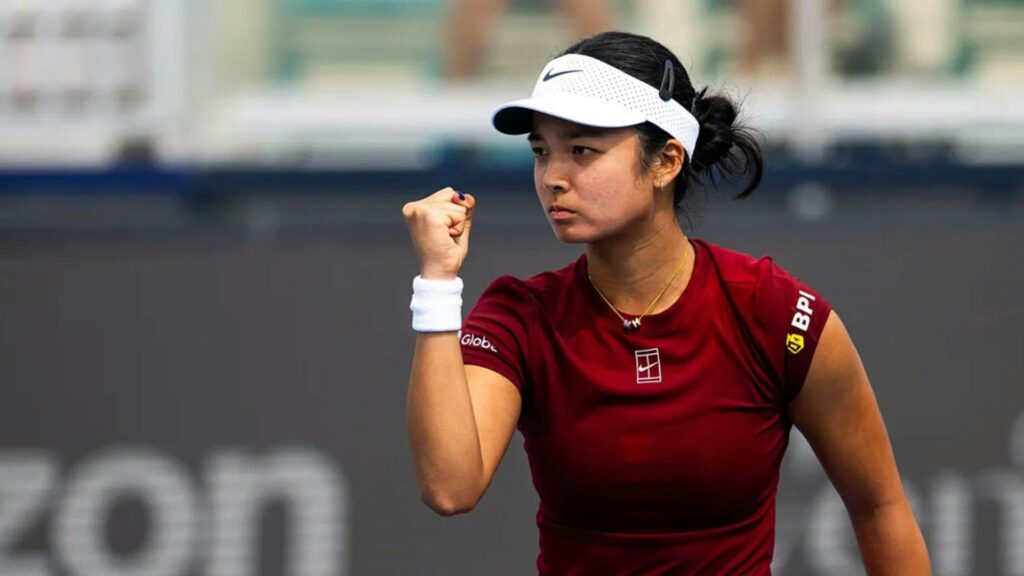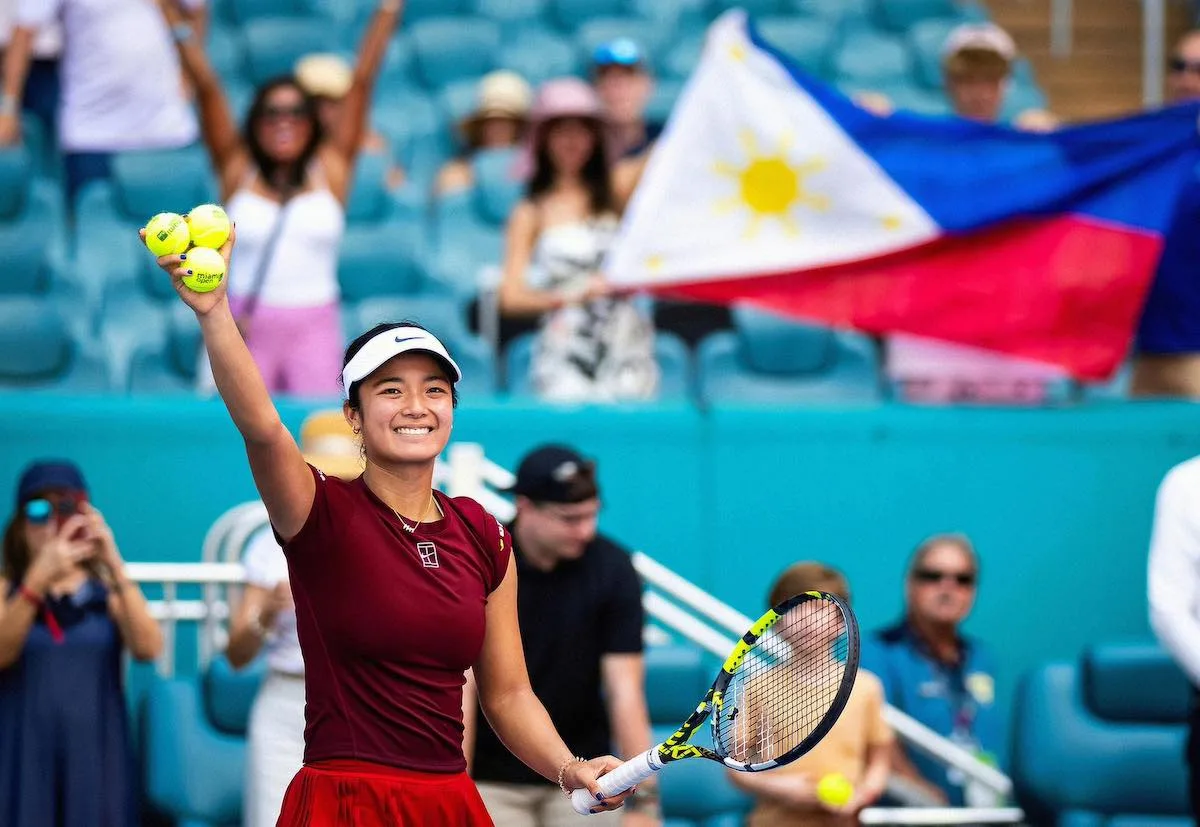Introduction: More Than Talent—It’s the Team
In the world of professional tennis, talent gets you noticed—but it’s coaching that gets you titles. For Alex Eala, the rising star from the Philippines, 2025 has been less about instant results and more about intentional growth. Her matches show sharper shot selection, smarter movement, and bolder tactical shifts. But behind this evolution isn’t just Eala herself—it’s the mind behind the racket: her coach.
As fans continue to celebrate her fighting spirit, many are beginning to ask: who is shaping Alex Eala’s game? And how crucial is this coaching relationship to her climb toward the WTA Top 50?
Let’s take a closer look.
From Junior Prodigy to WTA Mainstay: The Evolution Requires Guidance
Alex Eala’s rise has been anything but ordinary. A two-time junior Grand Slam doubles champion, she burst onto the scene with fluid groundstrokes, impressive footwork, and a poise far beyond her years. But the transition from juniors to the professional circuit is notoriously challenging—even for prodigies.
Unlike raw athleticism, the WTA level demands a blend of game intelligence, emotional control, and match adaptability. That’s where coaching becomes paramount.
Eala’s recent results suggest more than just natural progression. They show a player who is learning to manage tempo, disguise intentions, and play the long game—even on fast courts.
Who Is Behind Alex Eala’s Coaching in 2025?
In 2025, Alex Eala continues to work closely with a coaching team that builds on the foundation laid at the Rafa Nadal Academy. While the academy provided her with technical structure and discipline, her current setup is more personalized—designed to cater to the nuances of the women’s tour.

While specific names in her team aren’t always made public, insiders suggest that Eala’s camp now includes a tactical strategist, a physical conditioning expert, and a mental performance coach—a move that mirrors top-level setups.
This holistic approach speaks volumes: Eala isn’t just chasing results—she’s building longevity.
The Tactical Shifts in Her 2025 Game
Here’s what makes the “Alex Eala coach” storyline so fascinating: the transformation is tangible.
Let’s break down some of the tactical evolutions seen in her recent matches:
1. Patience on Clay
Once prone to early aggression, Eala is now showing patience in rallies, especially on clay. She builds points from deep behind the baseline, trusting her topspin-heavy forehand to wear opponents down. This speaks to coaching that encourages point construction, not quick fixes.
2. Variety in Serve Placement
Her first-serve placement has improved significantly—an intentional change likely drilled in practice. Mixing in wide serves, body shots, and occasional drop-second-serves shows a more layered service game.
3. Use of the Backhand Slice
We’re seeing more variety in her backhand, especially with a low slice used to break rhythm on fast surfaces. This is an underrated tactic that slows down aggressive baseliners—a clear sign of strategic coaching influence.
4. Net Play Integration
Perhaps the boldest sign of tactical evolution is her movement forward. Eala is approaching the net more frequently, trusting her touch volleys and angles. This added weapon helps shorten points—crucial for long matches and recovery on tour.
“Trust the Process”: How Coach-Player Chemistry Matters
In interviews, Eala has often mentioned the importance of “trusting the process.” This phrase isn’t just motivational fluff—it reflects a deep alignment between her and her coaching team.
Great coaching relationships in tennis require three things:
- Honesty: Brutal feedback when needed.
- Vision: A clear roadmap for development.
- Connection: Trust when the results don’t immediately show.
Sources close to Eala’s camp describe her current setup as a “long-term vision team.” They’re not chasing short-term rankings—they’re building a foundation for Grand Slam runs in the future.
The Mental Game: Coaching Beyond the Court
What separates great players from good ones is rarely just technique—it’s resilience. Alex Eala’s mental composure, even after close losses, is a testament to strong off-court coaching.
From breathing techniques during changeovers to embracing visualization exercises, her coach and mental performance advisor are clearly working to build a bulletproof mindset.
Fans might remember how she handled defeat at the 2025 Italian Open—not with frustration, but with reflection. In her post-match comments, she said:
“We’re on the right track. These matches are teaching me more than winning ever could.”
That quote screams coaching maturity.
The Rafa Nadal Influence Still Echoes
It would be impossible to talk about Alex Eala’s development without mentioning the lasting impact of the Rafa Nadal Academy.
Her coaching team continues to echo the Nadal philosophy:
- Discipline over drama
- Point-by-point focus
- Hard work as identity
This isn’t accidental. Nadal’s mentors built a system of “professional humility,” and Eala’s current coaches are doubling down on that model.
What’s Next? From Strategy Board to WTA Top 50
The question now is: can Alex Eala’s coaching team guide her into the WTA Top 50 this year?
Here’s what needs to happen:
- Consistency in smaller WTA events (250s and 125s) to gather ranking points
- Breakthrough wins over Top 30 players to boost confidence and exposure
- Health management to avoid injury setbacks
- Sustained tactical discipline across all surfaces
If she stays the course—and her coaching team keeps evolving with her—Top 50 is not a dream. It’s a likely milestone.
Social Media Snapshot: Fans Are Noticing
On TikTok, fans are creating point-breakdown videos of Eala’s match IQ. On Twitter (X), coaches are retweeting her court positioning maps. On Instagram, fitness experts are praising her improved recovery speed between sets.
This is the clearest sign that coaching is landing where it matters—in fan perception and industry respect.

Final Thoughts: Not Just the Next Big Thing—The Smartest One
Alex Eala’s story isn’t just about a girl from Manila chasing glory. It’s about how deliberate coaching, tactical evolution, and a team-first mentality are quietly crafting a future Grand Slam contender.
Behind every forehand winner and every calm stare down the line, there’s a coaching voice in her ear. One that doesn’t just prepare her for the next match—but for a lasting legacy.
So the next time you see Eala outsmart a seeded player, remember: the brilliance you’re watching is both hers and her coach’s.
The mind behind the racket? It might just be the reason the Philippines gets its first Top 20 star in women’s tennis.


